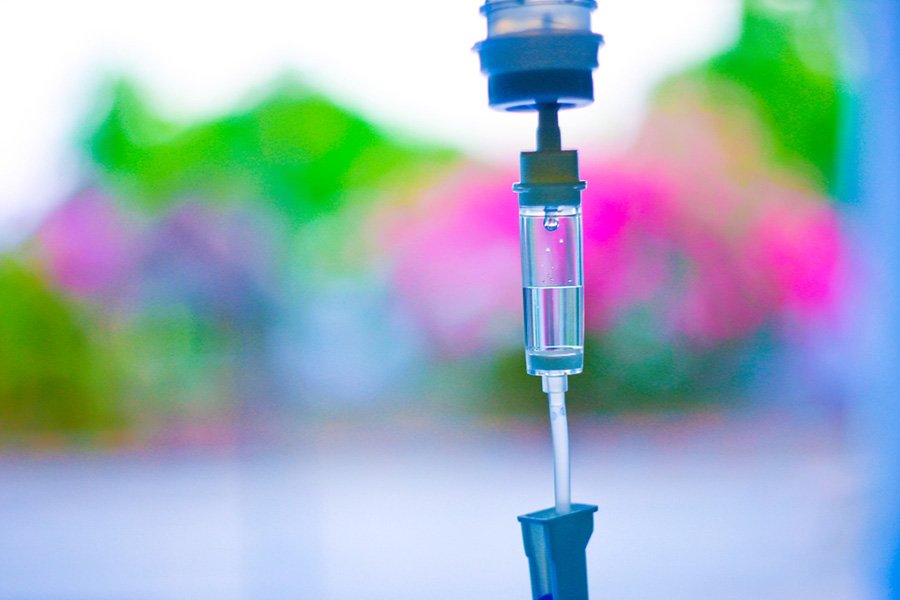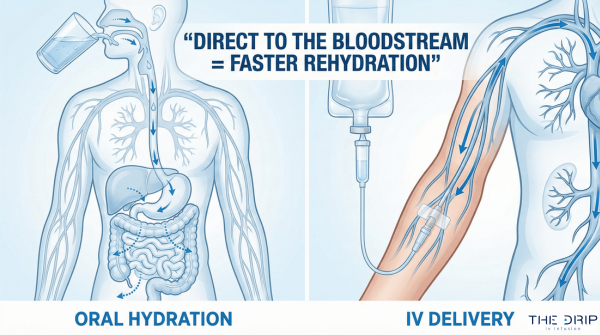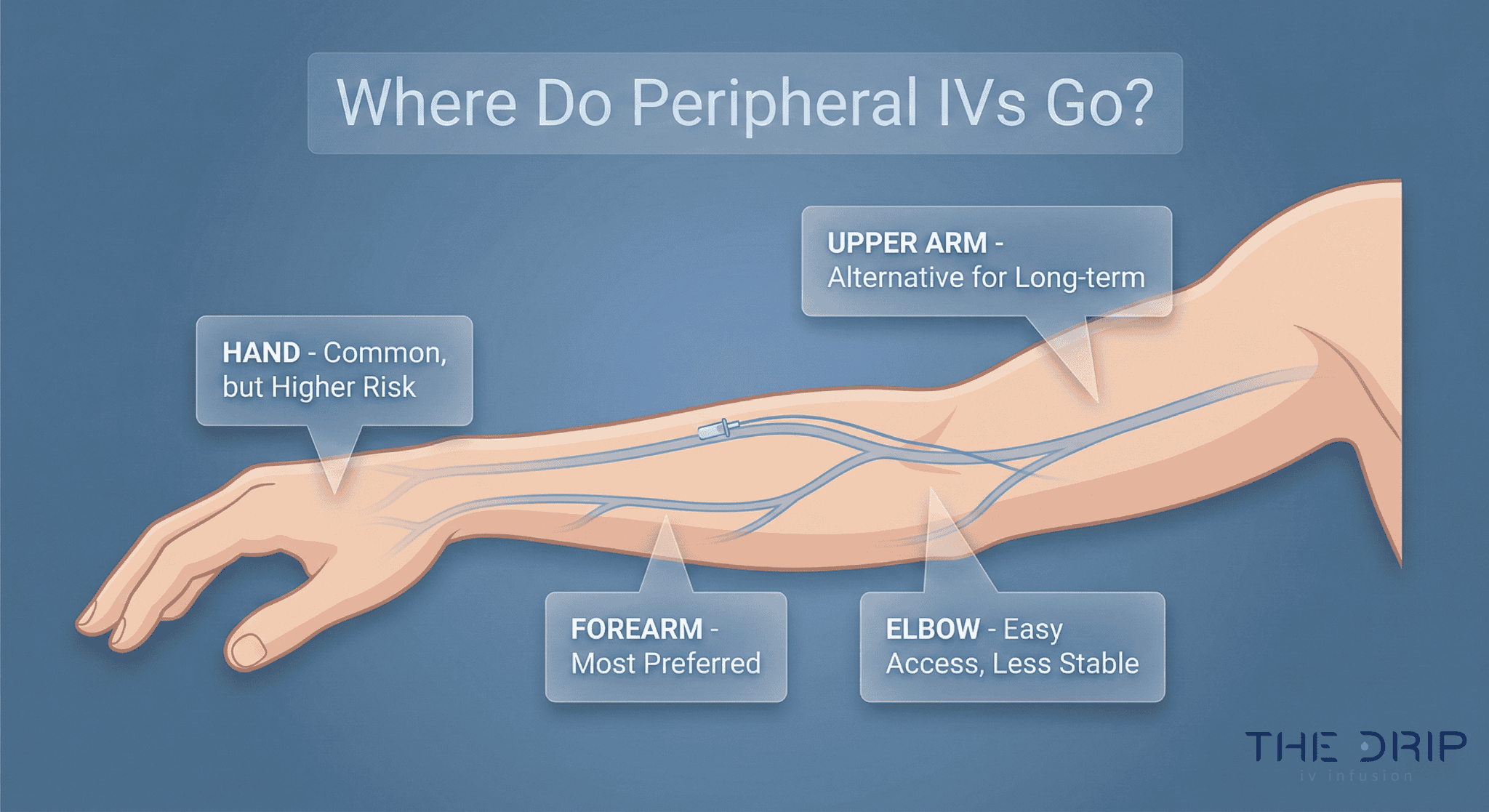With the rapid improvements in the medical field, getting professional IV therapy has become easier than ever. What used to be a complicated process in the past is now used for various medical reasons. But how effective is IV therapy?
In this article, we’ll elaborate on the success rates of IV therapy, the patient outcomes, and the overall impact and performance. You’ll be well-informed about the process and its benefits before you decide to get one yourself.
By taking a look at the IV therapy success rates, you’ll be more confident when making an appointment for your specific circumstances. If it’s your first time getting such treatment, seeing the IV therapy results will help you step into the process easily.
Continue reading to discover the effectiveness of IV treatment and the clinical studies that back it up!

Source: shutterstock.com / Photo Contributor: Numstocker
Types of IV Treatments and Their Process
Before diving into the IV therapy efficacy, you should first discover the different treatment options and their use. While you may have noticed many social media influencers promote this treatment as an effective hangover cure, you may benefit from various other opportunities. If you’re looking for a mobile IV therapy in Queen Creek AZ, you can choose from several IV cocktails depending on your needs and circumstances.
Each cocktail includes ingredients that may be beneficial for specific situations. For example, the renowned “Kitchen Sink” option possibly offers the ultimate sickness recovery. On the other hand, the “Mama Bear” cocktail is specially designed to potentially relieve the dreaded morning sickness.
Before scheduling an IV therapy appointment, you should first check if your condition is suitable for one. Then, you should always contact a professional medical team, such as The Drip IV Infusion, to ensure the best outcome and results. This way, you’ll know you’re getting your money’s worth and that your care is in good hands.
After you’ve made an appointment, a mobile IV service can accommodate you at your desired location. You’ll be able to enjoy some of your favorite pastime activities during the treatment before returning to your everyday activities.
How Effective Is IV Therapy?
Now that you know the basics of the IV therapy process, the next step is to elaborate on its efficiency and success. So, does IV therapy work well? This mostly comes down to your treatment goals and the IV therapy results you’re looking for.
While in some cases, it may help you get back on your feet at no time, in other instances, it may only lessen some of your symptoms. Thus, to better understand the effectiveness of IV treatment, you should consider the different conditions of why you’re getting one.
Here are some of the most common reasons why people turn to IV therapy and its effectiveness:
Hydration
Sickness relief
Hangover relief
Athletic ability
Pregnancy
Hydration
One of the most common reasons people turn to IV therapy is to hydrate themselves. Various conditions and reasons, such as high fever, alcohol consumption, and excessive loss of fluids, can cause dehydration. It may also lead to more severe and even life-threatening symptoms, including kidney failure, seizures, shock, and coma.
Since the base of any IV therapy is a saline solution, many studies have highlighted the performance benefits of rehydration with these fluids. In many cases, patients require a fast-acting and effective solution for a rapidly declining condition. That’s where the effectiveness of IV treatment comes into place due to its fast application and results.
While oral medicine takes time to be processed in the digestive system, an IV drip skips it entirely because it’s applied through an intravenous route. This way, the patient may start to feel the effects of the medicine faster, resulting in better outcomes.
Sickness relief
The second common use for IV therapy is sickness relief. Almost everyone has experienced the hardships of battling a nasty cold or flu that leaves them seeking a fast cure. Some of the most common symptoms during these conditions are fevers, headaches, fatigue, and body aches.
In order to get the best outcome from IV therapy for the flu and colds, you should always explain your symptoms to a licensed medical professional. This way, it’ll be easier to determine the proper dosage and the ingredients that should be included. Since various types of medicine can be inserted into the body through intravenous fluids, they may be fast-acting and efficient.
Since many high-risk patients often struggle with fighting off infections and viruses, research shows that applying medicine through intravenous treatment may offer many potential benefits. Some people struggle with taking oral pills, so IV therapy is the most suitable option for them.

Source: shutterstock.com / Photo Contributor: Srdjan Randjelovic
Hangover relief
Another common use for IV treatments is relieving hangovers. Most people have experienced the consequences of a wild night out accompanied by heavy drinking. Besides the common alcohol-induced headache, you may also experience dehydration, fatigue, nausea, and sensitivity to light and noise.
When it comes to the efficacy of intravenous therapy for this type of problem, many people believe that it’s a fast-acting cure. However, while it may reduce some symptoms, it may not help your liver digest the alcohol faster.
If you’re still interested in trying an IV treatment for this cause, here are some of the ingredients that help relieve specific symptoms:
Saline: A night of heavy drinking leaves your body dehydrated, so it’s important to get intravenous fluids to refresh it.
Vitamin C: The antioxidant properties of this vitamin may protect your body from free radicals and help battle the loss of energy.
Magnesium: Alcohol consumption is thought to deplete magnesium levels, so an IV drip with this mineral may help balance its levels.
Glutathione: May relieve hangover symptoms and aid in battling inflammation.
Zofran: May help in preventing vomiting and nausea that appear as a result of surgery or chemotherapy.
Pepcid: a remedy that may relieve symptoms of heartburn, reflux disease, and other conditions triggering increased stomach acid production.
Athletic ability
If you’re an active person who has devoted your life to sports, you may have heard that IV drips may improve your athletic ability. When you put your body through athletic strain, dehydration, and muscle cramps often appear. While you may be able to get the needed nutrients from a healthy diet, consistent strain may likely deplete these levels and lower your athletic ability.
Intravenous (IV) pre-hydration and rehydration may be used in athletes to prevent them from experiencing dehydration and muscle cramps.
Pregnancy
The last use of IV therapy you should know of is aiding in pregnancy and morning sickness. Many expecting mothers struggle with nausea and lose much-needed nutrients for their unborn baby. Not only can this hurt the soon-to-be moms, but it may also threaten their little ones.
The medical term for this unwanted condition is known as Hyperemesis gravidarum. Many studies show that if it’s left untreated, it may lead to disruption in kidney function, homeostasis, and electrolytes. While the first option for many expecting mothers is to find a suitable diet for them, there are also medical methods that may aid them, such as supplements and IV fluids.
If you’re willing to try this treatment, know that there are still studies being done on what the most beneficial combination of IV cocktails is for this condition. While some tend to go simply for the typical saline solution, others are more interested in the Mama Bear solution.
But in any case, IV fluids may be recommended and efficient for those experiencing morning sickness and need replenishment.

Source: shutterstock.com / Photo Contributor: Ground Picture
Conclusion
So, how effective is IV therapy really? After reviewing some of the most common reasons why people turn to this treatment, it’s easy to say that its effectiveness is based on the patient’s treatment goals. While it may be more effective in some cases, it doesn’t do much in others.
For example, IV treatments may be very beneficial if you’re looking to hydrate your body and aid it in battling sickness or morning sickness. Not only may they replenish your body, but they may also include medicine that may further improve your condition quickly.
On the other hand, if you’re looking for a fast hangover cure, this therapy may only lessen some of your symptoms. As for athletic ability, remember that there aren’t sufficient studies on IV fluids.
Lastly, if you need a mobile IV therapy service that offers professional care and premium results, don’t hesitate to contact The Drip IV Infusion. You will get the best possible care, and an expert team will guide you through each step of the process!




